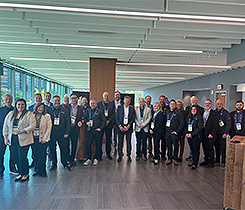Measuring impact of CNG delivery technology on large propane customers
Similar to propane’s business model built on portable attributes, NG Advantage is delivering compressed natural gas (CNG) by the tankful from a natural gas compressing facility in Milton, Vt.
NG Advantage’s CNG service is being promoted as an economical energy source for large industrial and commercial customers who have been relying on coal or fuel oil for their manufacturing processes.
Propane is also a target of NG Advantage’s marketing push, leading some within the industry to speculate on the kind of impact the new company will have on current and potential propane customers.
In March, Soundview Paper Co., NG Advantage’s first customer, began using natural gas instead of oil as boiler fuel for its recycled tissue, towel and napkin operations in Putney, Vt. And in the next several months, NG Advantage will begin deliveries to Pike Industries’ asphalt plants in New Haven and Waterford, Vt.; the FiberMark facility in Brattleboro, Vt.; and Erving Paper in Erving, Mass.
“The new availability and low price of natural gas is great for the United States,” says Tom Evslin, who cofounded the company in 2011.
“It has already resulted in more jobs, new factory openings and significantly lower pollution, as natural gas is substituted for coal and oil,” he adds.
Factors at play
Such services are common in Asia and South America via the same equipment being introduced by NG Advantage to the domestic marketplace, with several developments fueling the business model in the United States.
“Horizontal drilling and hydraulic fracturing have dramatically driven down the price of natural gas in North America,” Evslin says. “Composite materials have led to the development of practical shipping containers for compressed gas. And modern communication lets us track trucks and customer usage in real time.”
NG Advantage CEO Neale Lunderville says the company has received interest from around the country, but it’s taking its first steps in the Northeast. Its first compressor station opened early this year in Milton, Vt., and additional New England sites will come online this year, according to its website.
Evslin explains that “low natural gas prices are actually a problem for energy-intensive businesses located off the pipeline; their competitors with access to pipeline gas have much lower energy costs.”
Thus, the trucking is being presented as a cost-effective alternative. Typical customers will save 30 percent to 40 percent of their 2012 bill for oil or propane, according to the company.
“This type of market activity, the CNG delivery systems being developed right now, will be a threat to the largest of propane customers,” says Mike Sloan, principal at ICF International, who raised the topic during a presentation to the Propane Education & Research Council in April.
“However, it’s new technology and does not have a proven track record yet, so propane companies that have worked with their large customers for extended periods of time should have a track-record advantage.”
The CNG delivery system also has the potential to impact good potential propane markets, Sloan adds. With the price disparity between propane and fuel oil, an opportunity exists to convert big fuel oil customers to propane. This technology could slow that process.
Role of composites
The technology driving the actual deliveries is equally noteworthy in that NG Advantage is among two U.S. firms – a liquefied natural gas (LNG) provider is the other – debuting Titan gas transport modules made of a new composite material.
“The first Titan orders to the North American market represent a major milestone for us,” says Chet Dawes, sales director at Norway-based Hexagon/Lincoln Composites.
“Titan has opened up the domestic CNG supply market and allows our customers to take advantage of the same operational cost savings we have seen demonstrated in other areas of the world,” he adds.
The modular design handles up to 355,000 cubic feet of natural gas on a 40-foot trailer with a gross tractor-trailer weight of about 80,000 pounds. The gas is used directly from the trailers.
Vermont’s Soundview Paper Co., which acquired Putney Paper Co. early this year, is among the initial NG Advantage clients now moving away from oil-fired burners. The company has said converting to natural gas will make it more competitive in an energy-intensive industry, placing it on a level playing field with companies located on the gas mains.
Pike Industries Inc., which supplies aggregates, asphalt and ready-mixed concrete along with construction and paving services, is another NG Advantage customer eager to make the switch from oil. The company employs 1,000 people at 40 asphalt plants and 20 crushing facilities across Vermont, New Hampshire and Maine.
“This partnership represents an incredible opportunity to lower paving costs,” says Christian Zimmerman, Pike’s president. “We can make the most of our short construction season and continue to locate asphalt plants close to paving projects even if these areas are not served by pipelines.”
Building a “mother station”
A propane provider who also markets natural gas questions the efficiency of trucking CNG, suggesting that the energy content is significantly less than what liquefied natural gas can bring to the equation.
“If you’re just hauling vapor, you don’t have as much energy in the bottle as you would with propane or LNG,” says Mike Sheehan, owner of Sheehan’s Gas Co. in Bird Island, Minn. “I’m not an expert, but I don’t see how it’s going to work – and I’ve been down that road before.”
Lunderville counters, saying CNG has a lower cost of production and storage compared to LNG, because it does not require an expensive cooling process and cryogenic tanks. “CNG, however, requires a much larger volume to store the same mass of natural gas and the use of high pressures,” he says.
“Many of the customers we serve are too small for the capital costs of LNG,” says Evslin, making CNG “cheaper and fully competitive” for the targeted customer base.
Although it is not involved with NG Advantage’s efforts, R.H. White Construction in Bow, N.H., builds CNG and LNG gas plants, and business development manager Lee Ransom says the key to success with CNG involves keeping a lid on delivery logistics.
“You have to be close to a source,” he says. “CNG trucking becomes unprofitable after 100 to 120 miles.”
Ransom reports that “you try to get four or five people in an area signed up. Then you build a ‘mother station,’ but you can’t build a mother station anywhere – it has to be on a gas line.”
As for propane, Lunderville says, “Its price tends to track oil product prices and so it is much more expensive than CNG, even though it is easier and cheaper to transport than CNG.”
NG Advantage is targeting customers using more than 150,000 gallons of oil and/or propane per year or 100,000 gallons during a six-month period and are located less than 200 miles from a compressor site.
“Customer contact is key for big customers, where this may be a threat,” Sloan says in reference to the propane industry. “The propane companies that are in touch with their customers and understand what the customers’ needs and concerns are should have better relationships with their customers than CNG companies do, and they should have the ability or opportunity to compete as long as they are maintaining good communication with their customers.”
NG Advantage addresses safety concerns of the CNG system on its website, sourcing the U.S. Environmental Protection Agency in calling CNG “an inherently safe fuel” with “strict safety standards.”
Milton fire, rescue and police departments responded in March to a report of a natural gas leak at NG Advantage, according to the The Milton Independent. A trailer’s emergency vent system released 350,000 cubic feet of CNG without a known cause, the article stated.
Photo courtesy of NG Advantage
















